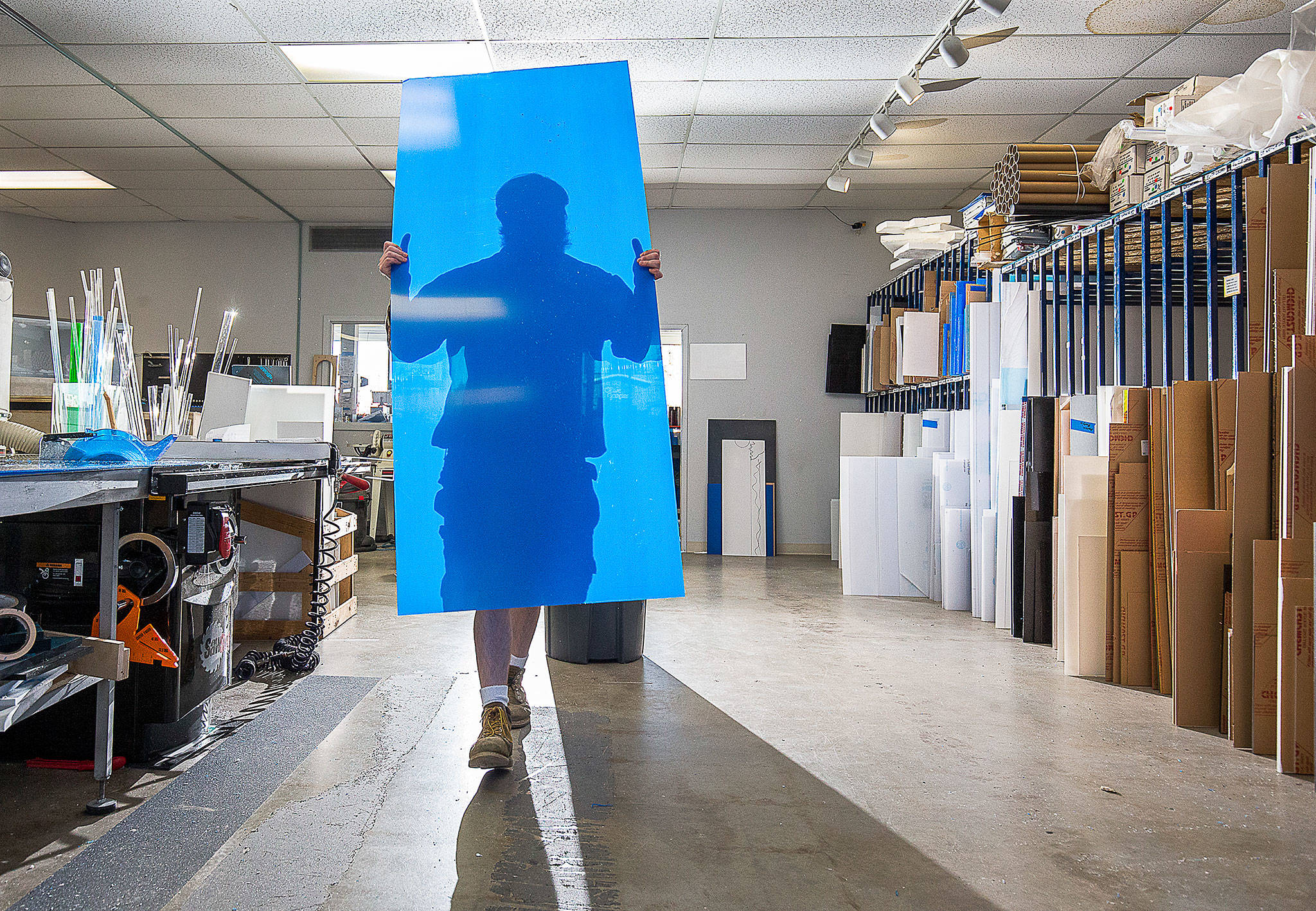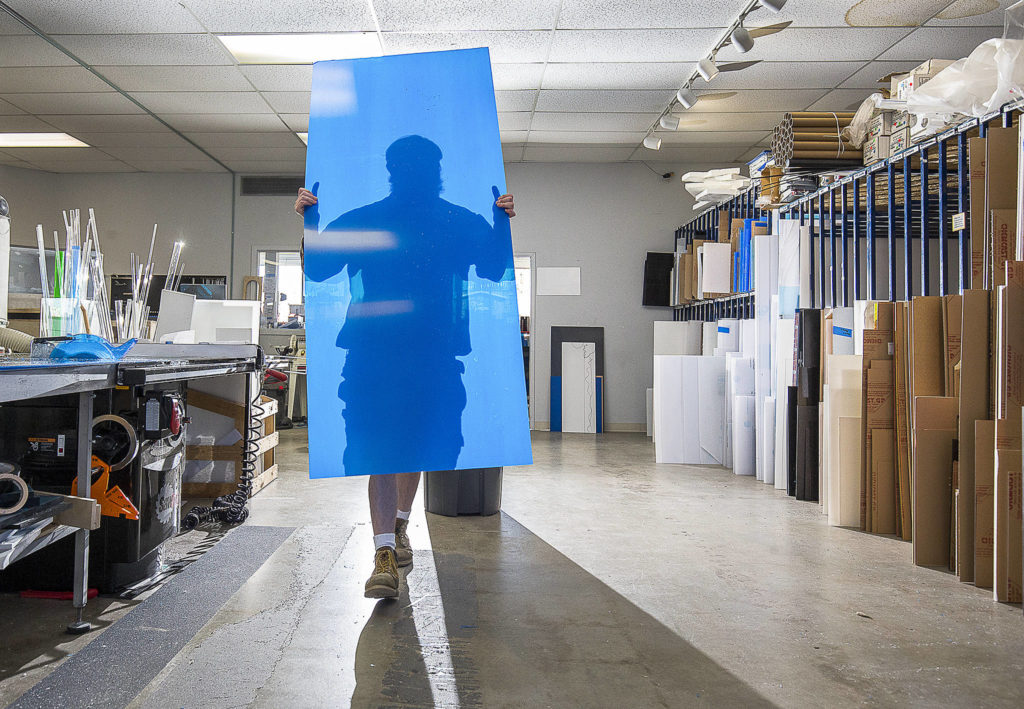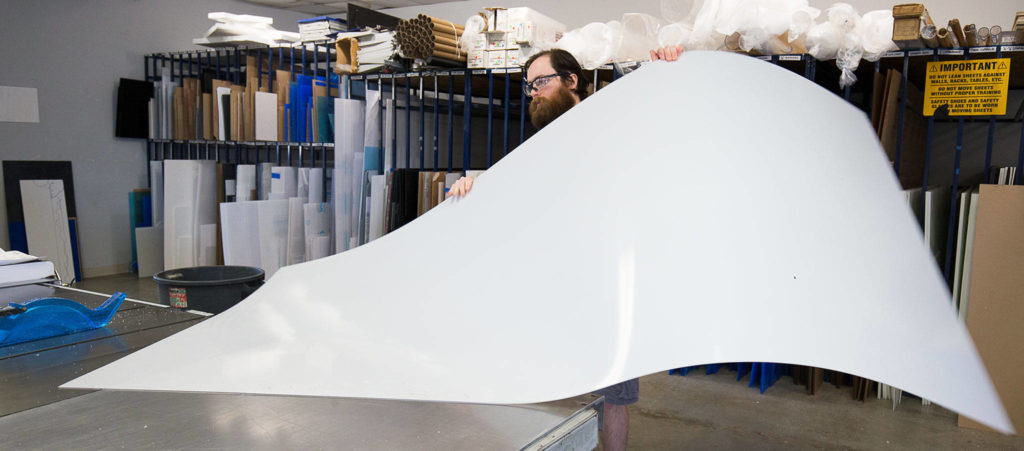LYNNWOOD — Three or four months ago, these simple plastic boxes would have been considered medical devices and subject to federal scrutiny.
Now, in the midst of the COVID-19 pandemic, do-it-yourselfers and plastic fabricators are ramping up to build or supply the materials for the see-through cubes, including TAP Plastics store at 4232 196th St. SW. in Lynnwood.
The clear plastic boxes, called intubation or aerosol boxes, add another layer of protection in helping shield health care workers from infectious droplets.
The simple device, a plastic glass cube with two circular ports, fits over a patient’s head. The ports allow medical staff to slip their hands inside the box and attend to a patient.
While it takes a little getting used to, an aerosol box can cut down on the spread of contamination, doctors at Boston Medical Center told The New England Journal of Medicine.
A single cough can contaminate a health care worker’s face, face shield and clothing with virus. The aerosol box may help limit transmission. And to prove their point, they made a video demonstrating how the box works.
Health care workers are most vulnerable to infection when they’re performing close-proximity and invasive medical procedures such as intubation or tracheotomy.
The aerosol box was designed by Dr. Hsien Yung Lai in Taiwan. Lai open-sourced the design for anyone to use.
Made of cast acrylic, it can be disinfected and re-used by hospitals and COVID-19 care facilities.
TAP Plastics, a plastic fabrication firm with retail stores in Bellevue, Seattle and Lynnwood, is among the first in the Puget Sound region to heed the call for supplies.
Ben Winslow, manager of TAP Plastics in Lynnwood, said he’s had calls about the box design from medical staff at the University of Washington.
The company fabricates display boxes, boat windows, models and art objects for hobbyists and commercial firms, Winslow said.
“We’re a jack-of-all trades,” said Winslow. “Do you remember when China’s Terracotta Warriors came to Seattle? We built some boxes for the exhibit.”
Before the COVID-19 outbreak, federal regulations would have required TAP and other companies to register and seek approval for the manufacture of any new medical equipment.
But the pandemic has altered nearly everything, including new Food and Drug Administration emergency rules governing the manufacture of hand sanitizer and medical devices.
For example, the FDA is allowing companies to make limited modifications to ventilators and respirators without having to file additional paperwork.
The FDA also enacted emergency measures to hasten the production of some types of vital personal protective equipment. That includes new emergency measures and expedited approval processes.
Medical devices fit into three FDA categories. The simplest — the first category — includes items such as bandages and dental floss; the second category includes more complex X-ray machines and some ventilators, while the third category encompasses many life-saving devices, such as pacemakers and heart valves.
Although classing any new medical device can be challenging, experts say, the intubation or aerosol box might fall into the first or second category.
TAP, a San Francisco-based company, began building intubation boxes a few weeks ago for hospitals in Northern California, said Elizabeth Whitehouse, TAP’s president.
“Several of our orders came from social media,” said Whitehead, whose firm has been tweeting about the boxes.
“Each of our stores has a fabrication department. Making them individually takes about 40 minutes,” Whitehouse said.
TAP employs about 165 across stores in Northern California, Oregon and Washington and through its online operations.
“We’re ramping up to make them — that includes the Bellevue and Seattle stores,” Winslow said.
Meanwhile, TAP also makes or supplies plastic for face shields and sneeze guards for local hospitals and health care facilities.
Said Whitehouse, “It has been really great for our employees to be part of this work and be part of a great response to the solution.”
Janice Podsada; jpodsada@heraldnet.com; 425-339-3097; Twitter: JanicePods
Talk to us
> Give us your news tips.
> Send us a letter to the editor.
> More Herald contact information.



























